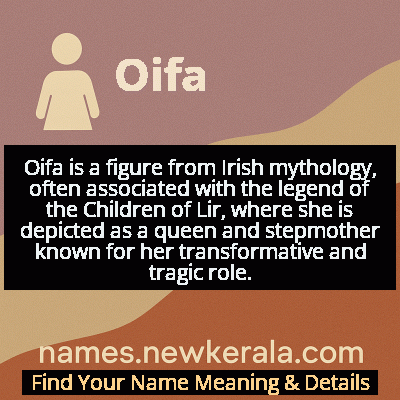Oifa Name Meaning & Details
Origin, Popularity, Numerology Analysis & Name Meaning of Oifa
Discover the origin, meaning, and cultural significance of the name OIFA. Delve into its historical roots and explore the lasting impact it has had on communities and traditions.
Name
Oifa
Gender
Female
Origin
Celtic
Lucky Number
4
Meaning of the Name - Oifa
Oifa is a figure from Irish mythology, often associated with the legend of the Children of Lir, where she is depicted as a queen and stepmother known for her transformative and tragic role.
Oifa - Complete Numerology Analysis
Your Numerology Number
Based on Pythagorean Numerology System
Ruling Planet
Uranus (Rahu)
Positive Nature
Strong sense of order, loyal, practical, and disciplined.
Negative Traits
Stubborn, overly serious, rigid, and prone to feeling restricted.
Lucky Colours
Blue, gray.
Lucky Days
Saturday.
Lucky Stones
Blue sapphire.
Harmony Numbers
1, 7, 8.
Best Suited Professions
Managers, engineers, accountants, organizers.
What People Like About You
Dependability, discipline, practicality.
Famous People Named Oifa
Oifa (Mythological)
Mythological Figure
Central character in Irish myth 'The Children of Lir' known for tragic transformation story
Aoife MacMurrough
Noblewoman
12th century Irish noblewoman who played key role in Norman invasion of Ireland
Aoife Ní Fhearraigh
Traditional Singer
Contemporary Irish singer preserving Celtic musical heritage
Name Variations & International Equivalents
Click on blue names to explore their detailed meanings. Gray names with will be available soon.
Cultural & Historical Significance
The name Oifa/Aoife embodies the Celtic fascination with powerful, complex female characters who possess both great beauty and formidable magical abilities, reflecting the Celtic view of women as potentially dangerous and transformative forces in society. Throughout Irish literary tradition, from ancient manuscripts like the Lebor Gabála Érenn to modern retellings, Oifa remains a symbol of feminine power in its most raw and untamed form. Her character explores themes of jealousy, redemption, and the price of magical power, making her one of the most psychologically complex figures in Celtic mythology. The enduring presence of her story in Irish culture demonstrates how mythological figures continue to shape cultural identity and moral understanding.
Extended Personality Analysis
Individuals named Oifa are often perceived as possessing intense emotional depth, strong willpower, and magnetic charisma. They tend to be passionate and determined, with a natural leadership quality that draws others to them. However, like their mythological namesake, they may struggle with intense emotions, particularly jealousy and possessiveness, which can be both their greatest strength and most significant challenge. Their complexity makes them fascinating but sometimes difficult to understand, as they often contain contradictory qualities within themselves.
Modern bearers of the name often display artistic sensitivity, intuitive understanding of human nature, and a transformative quality that allows them to reinvent themselves throughout their lives. They are typically drawn to creative pursuits, psychological exploration, and positions where they can exert influence over others, whether through leadership, teaching, or artistic expression. The mythological legacy lends them an air of mystery and depth that others find compelling. While they can be fiercely loyal and protective of those they love, they may need to consciously work on managing their intense emotions to avoid the destructive patterns associated with their namesake. Their journey often involves learning to channel their powerful energies constructively rather than destructively.
Modern Usage & Popularity
In contemporary times, the name Oifa (primarily used as Aoife) has experienced a significant resurgence, particularly in Ireland and among the Irish diaspora. It consistently ranks among the top 20 most popular girls' names in Ireland, reflecting a broader cultural revival of traditional Irish names that began in the late 20th century. The name has gained international recognition through Irish cultural exports, literature, and celebrities choosing it for their children. While still relatively uncommon outside Celtic communities, its beautiful sound and rich mythological background have attracted parents seeking unique yet meaningful names with deep cultural roots. The modern usage often emphasizes the name's connection to strength and beauty rather than the tragic aspects of the mythological character, representing a reclamation of Celtic feminine power in contemporary naming practices. Social media and global connectivity have further spread awareness of the name, making it increasingly familiar to non-Irish audiences while maintaining its distinctive Celtic identity.
Symbolic & Spiritual Meanings
Symbolically, Oifa represents the duality of feminine power - both creative and destructive, beautiful and dangerous. The name carries connotations of transformation, magic, and emotional intensity that resonate across cultural boundaries. In Celtic symbolism, she represents the archetype of the 'Dark Goddess' or the 'Terrible Mother' who brings necessary destruction for eventual renewal, reflecting the Celtic understanding of life's cyclical nature. Her story symbolizes how unchecked emotions can lead to tragic consequences, but also how redemption is possible through suffering and atonement. The swan transformation in her most famous myth connects her to universal symbols of grace, beauty, and the soul's journey between worlds, while also representing the idea that true nature cannot be permanently concealed. Modern symbolic interpretations often focus on her as a representation of female agency, complexity, and the power of women to shape destinies through both love and wrath. She embodies the concept that great power carries great responsibility and that emotional mastery is essential for wielding influence wisely.

